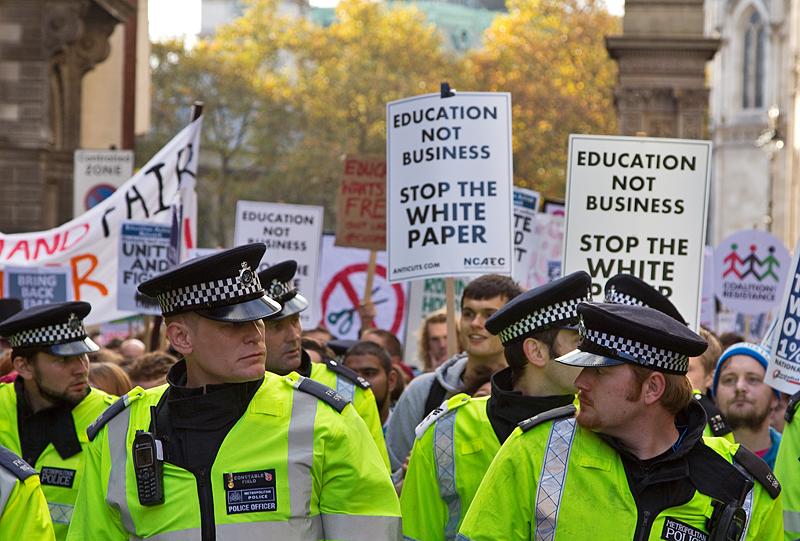
This week, the left of the internet has been awash with Guardian-reader outrage over the Metropolitan Police’s refusal to police demonstrations which are expected to be crime-free, and their request that protest organisers hire private security at a cost of over £100 a day.
This is set to affect two planned actions – the Time to Act march and Million Women Rise, both on 7 March. Whilst Campaign Against Climate Change (the people behind Time to Act) have shelled out for public liability insurance, the Million Women are marching anyway, and it is yet to be seen if this ‘pay-to-protest’ policy will be rolled out to other groups. Aside from the fairly widely-expressed shock and awe at the extent of privatisation in Britain today, let’s consider what the ramifications of this are for activism and demonstrations in the UK.
1.TUC marches will become even more sterile and boring.
I’m open to being surprised, but I don’t see the leadership of the Trades Union Congress refusing to co-operate with the police for their almost annual anti-austerity trudge down the Embankment, and it is probably the only organisation which is both politically anodyne enough to willingly swallow the costs and has deep enough coffers to pay them.
Expect more quiet wanders around routes which circumnavigate anywhere of political importance, whilst having your hand held by an official, paid-for steward from G4S – which also means more stewards who’ll work against anyone wishing to leave the march route for more exciting actions.
2. The NUS leadership will use this to scupper the student left.
The National Union of Students is run by a clique backed by wet Blairite Labour Students, and they don’t like free education or any form of acting on their principles at all. The free education movement can’t win within the NUS: pass policy for them to organise a demo, and you end up on the long march to Kennington; organise a demo yourself, get them to support it, and the leadership strings you along for a bit and then overturns the decision of their executive on some spurious safety concerns.
Now imagine the arguments available to them in the light of this policy: either that they cannot afford to hire private stewards, or that the necessity of policing means criminal activity is likely, and so it must be unsafe for their members. Let’s wave goodbye to any hope of co-opting the NUS’s money to organise Millbank 2.
3. People might start to realise that safety and public order policing are incompatible.
A lot of the outcry over this has been about quashing of the right to protest safely, with organisations like Liberty and the organisers of Million Women Rise stating more or less that policing is necessary at a demonstration for the safety of activists involved.
I’m not sure where they were when ribs got broken, children detained illegally on a freezing cold bridge and blood left on the pavements of Bloomsbury, but I can’t remember a time when policing has made anyone feel or be safer on a demonstration. There is a lot more to be written about conceptions of safety and safer spaces, especially from within the women’s movement where a quest for safety in particular spaces often leads to the side-lining of actually fighting oppression, but given that the Million Women are now marching in defiance of police and private security – as well they should – this should show that a march without police is not automatically less safe.
4. If this policy is here to stay, we might see some stagnation in the turnover of activists.
A lot of established activists sniff at the inability of the A to B march to effect anything, and it is this sort of activism which will be affected by the policy. Their reservations are fair enough, but it’s worth remembering that not everyone enters activism with pre-formed radical politics and a penchant for direct action. A vibrant march is empowering, and a vibrant march that gets shut down by the police is radicalising, as well as an invaluable lesson in collective solidarity which builds links between activists.
If protest culture in London gets pushed towards more radical actions and there is a sudden dearth of ‘entry level activism’ like your A to B march, then we could well miss out on a couple of layers of new activists – especially in the student movement, where turnover of organisers is particularly high and institutional memory is somewhat lacking. This could mean that the number of people organising stagnates, and we end up losing some of the momentum gained since November. On the other hand, smaller but more focused actions may prove more effective.
5. This will push protest and direct action in a more radical and disruptive direction in London.
As we have seen with Million Women Rise, the ‘pay-to-protest’ policy is pushing groups who would normally organise a ‘facilitated’ demonstration away from negotiating with the police and into open defiance. Politically this is very good. In the long run it could be the death knell for A to B marches (unless you’re the TUC of course) as they become unfeasible to facilitate and force groups to take the more disruptive options of shutting stuff down, road blocks and occupations to make their points.
In terms of less disruptive actions, I predict we’ll see the rise of stunts and creative protests to gain media attention, such as those used frequently by People & Planet for their Fossil Free campaign. No one ever made history by asking nicely, no matter how many people ask nicely at the same time in Parliament Square, and this could be the wake-up call that many activist groups have been waiting for – when they don’t let you ask nicely for what you want, you have to start kicking off a bit.